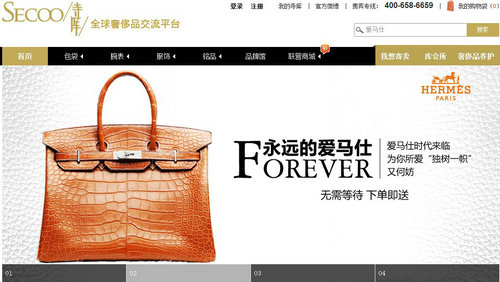Market research: Second hand luxury market in China
The Second hand luxury market in China is still in its early stages, but is showing signs of huge growth potential. In 2013, the market was valued at about RMB 3 billion, benefiting from a 30% annual growth rate. That year, there were 823 second-hand luxury shops in the Chinese mainland; 311 more than the year before (38% annual growth rate).
Why second hand luxury market is booming in China
China is now the largest consumer of luxury products in the world, accounting for roughly 30% of total world demand according to the latest market researches. The consumption of luxury goods in Mainland China amounted to RMB 116 billion (USD 19.1 billion) in 2013, although the industry now grows slowly in the country (2% growth in 2013). In China, luxury goods are an important means of showing one’s belonging to a particular group and gaining approval from others. Typically, they demonstrate a certain degree of success and an ability to keep up with fashion trends. One survey indeed finds that 75% of Chinese consumers see brands as status symbols.
This is why the Chinese are known to be extremely keen on buying luxury goods, despite having relatively low salaries. In fact, it is not uncommon for young adults (20-40 year olds) to spend a large share of their income on high-end products in China. And indeed, only 30% of the Chinese consumption of luxury goods in undertaken by very wealthy individuals, while the remaining 70% is conducted by white-collar workers with an annual income typically below RMB 100,000. The importance of luxury, in a country where incomes are low on average, explains why the industry of second-hand luxury is so promising. People are likely to purchase genuine luxury products (as opposed to imitations) if they are cheaper, no matter if these products are second-hand or not. The importance resides in the ownership of an authentic luxury product with the potential to impress others.
Why second hand luxury market in China are suitable with local culture
Several factors further explain the growth potential of this industry in China. First of all, the types of luxury goods that are the most popular in China are suitable for second-hand purchases. Indeed, handbags and watches are both the most popular new and second-hand luxury goods. These particular categories of products have the merit of being somewhat impersonal and long lasting.
Secondly, Chinese buy more and more of their luxury products at home, as opposed to purchases during trips abroad. Indeed, 53% of the Chinese consumption of luxury products was undertaken in Mainland in 2013, rising from 48% in 2011. This share will only increase in the future, especially since the demand for Chinese luxury goods is rising (driven by significant government investments).
Thirdly, the gift-giving culture in China results in a high supply of second-hand luxury goods, as many people are willing to sell luxury products they received but have no use for. According to some estimates, the value of unused luxury goods is at least RMB 300 billion in China, and is increasing annually by 20%. In addition, Chinese are already used to buying luxury goods on the Internet, with over RMB 20 billion of online transaction in luxury products undertaken in 2013. Having such a system in place is important, as the Internet is a crucial platform for the second-hand luxury industry.
There are also interesting opportunities to be made for retailers. Typically, second-hand luxury products are sold 30-70% less than the original price.Shop owners reportedly buy second-hand luxury goods for about one-third of the initial value, and resell the goods at around half the original price. These factors explain the significant growth potential in China: a large number of potential consumers (looking for cheap yet desirable products) and sellers (looking to get rid of goods they don’t need), as well as the opportunity to make large profit margins for retailers.

Second-tiers cities’ market raises questions
Many of second-hand luxury retail stores were opened in provincial cities (e.g. Hangzhou, Changsha, Chengdu), which is a clear sign of market expansion. Nevertheless, one recent survey reveals that consumer willingness to take part in the second-hand luxury industry is drastically lower in provincial cities, as opposed to Shanghai and Beijing. This is explained by a lower willingness of richer individuals to buy second hand products, and a lower willingness of the less wealthy to purchase prestigious products (as opposed to fake or non-luxury goods), in second-tier cities.Consequently, although provincial cities are already profitable markets for luxury goods in general, it is still unclear if they will become lucrative market places for the second-hand luxury industry. The same survey shows that young and less wealthy individuals are much more likely to both purchase second-hand products and sell their own luxury possessions. Second-hand luxury businesses consequently mostly target middle-income white-collar workers, who are the most likely to be interested in genuine luxury goods at affordable prices.
Milan Station, Secoo, large retailer gains market share in Second hand luxury market in China
Small shops typically occupy a large share of the second-hand luxury market in China, although large retailers are gradually gaining a strong foothold. It is the case of Milan Station, a Hong Kong based company, which opened its first shop in Mainland in Beijing in 2009. Milan Station now has three stores in Beijing and two in Shanghai. Similarly, Secoo has opened three shops in Beijing, Shanghai and Chengdu. Both of these firms make a significant part of their sales via their online platform. And indeed, the growth potential is largest in the online shopping industry, as Chinese consumers increasingly turn to the Internet when conducting their luxury shopping. When it comes to second-hand luxury goods, the Internet is particularly attractive as shoppers are far more likely to browse through the available options before buying, and the Internet offers a much wider choice of products to choose from when compared to a physical store.

To read more:
https://jingdaily.com/tag/second-hand/
https://www.chinadaily.com.cn/business/2013-10/18/content_17044383.htm
https://qz.com/143816/chinas-corruption-crackdown-is-helping-fuel-a-second-hand-luxury-market/




